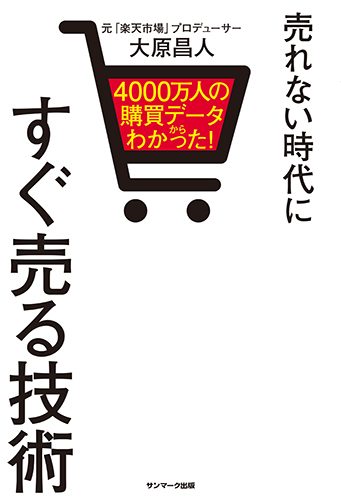


978-4-7631-3780-7 C0030
222 pages / October 2019 / 1,400 yen (w/o tax)
Never again will you struggle to sell.
Big Data analysis at Rakuten reveals a way to double sales!
After closely analyzing the buyer data of 40,000,000 people, Masato Ohara earned Rakuten a record profit of 683 billion yen during a 1-week Rakuten Super Sale. Ohara says the secret to increasing sales is understanding the “Sales Formula.”
This formula is as follows:
Sales = Customer Traffic x Conversion Rate x Average Customer Cost
Attempts to increase sales without a clear understanding of this formula tend to fail.
However, if implementing this formula still leads to no results, there are some reasons. Those who cannot generate sales tend to think, “We aren’t selling because customers aren’t coming,” or, “They aren’t buying because we aren’t lowering prices.” They mistakenly think the problem lies in customer traffic or the average customer cost. Ohara points out that increasing the conversion rate of a business is the real key to improvement.
Conversion rate = The percentage of store visitors who actually purchase an item
No matter how fabulous the product or how high the number of visitors, sales will never improve without increasing the conversion rate.
A particular approach is needed to convince customers to actually buy your wonderful, well-priced product.
Ohara’s analysis of a vast amount of buyer data revealed a foolproof way to increase the conversion rate of a business. Improved wording, imagery, site layout, and product description can all make a difference, increasing sales by five to ten times.
Only a very small portion of Rakuten employees are permitted to view the company’s essential buyer data, and information related to the data would normally never be released to the public.
Every businessperson can now learn the sales know-how that Rakuten’s data analysis has revealed.
Chapter 1 People lie, data doesn’t
◎ What percentage of 40,000 stores are actually selling?
◎ “It’s hard to sell to this generation” is a false statement
◎ What should a company without data do?
◎ Don’t underestimate the importance of housewives aged 30 to 70.
Chapter 2 The basic laws of sales
◎ Sales = customer traffic x conversion rate x average customer cost
◎ Doing things logically and “correctly” is not enough
◎ Use the “high-middle-low” principle for setting prices
◎ Why IKEA is with Amazon and Don Quijote with Rakuten
Chapter 3 What products sell themselves?
◎ 3 ways to increase customer traffic
◎ Recommended online advertising methods and budget
◎ Drinks/water sell better with a white background
◎ Raw eggs are hot sellers online
◎ Social media posts are not the end-all-be-all
Chapter 4 How to sell anything quickly
◎ Lessons learned from offering free shipping for Christmas gifts and cheesecake
◎ How a simple color change earned Google 2 billion dollars
◎ The “train door theory” and optimal timing
◎ When taking pictures, brightness is more important than method
◎ For avoiding failure online and in life
When I was a student, I took a course on data and spent a lot of time doing research and experiments. I was naturally intrigued by Ohara’s story, and spending time with him showed me just how valuable his information is.
The world is full of data, but much of it is unreliable. Unreliable data represents a small sample set or a sample that generates biased data. A sample set of 10,000 is large enough, so Rakuten’s sample set of 40,000,000 people is quite extraordinary. A sample of that size generates highly reliable data from which repeatable solution strategies can be developed. Having access to such a large data set would excite the socks off of anyone with crunching experience.
With the increased presence of AI in business, Rakuten’s big data is a major part of the company’s success. The useful information revealed by the data can now be added to the arsenal of every businessperson.
